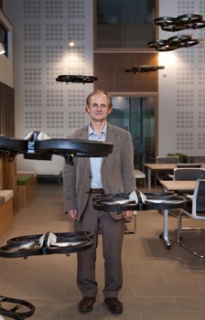Dec 8 2014
A team of UK researchers is embarking on a collaborative project to ensure that the autonomous robots we build in the future will be safer, making decisions that are ethical and follow legislation on robotics.
 Sandor Veres and flying robots
Sandor Veres and flying robots
Robots that can think and act without human intervention are moving from fiction to reality. The nuclear, aerospace, manufacturing and agricultural industries are starting to develop autonomous systems that can carry out tasks that are either too difficult or too dangerous for humans, while driverless cars are already with us.
Researchers at the Universities of Sheffield, Liverpool and the West of England, Bristol have set up a new project to address concerns that might arise around these new technologies and link new developments to existing industrial standards and responsible innovation frameworks. Funded by the Engineering and Physical Sciences Research Council, the £1.4M project will continue until 2018.
“This project brings together world-leading teams from these three universities to develop formal verification techniques for tackling questions of safety, ethics, legality and reliability across a range of autonomous systems,” explains Professor Michael Fisher, principal investigator at Liverpool.
He adds: “Each of the three institutions will make a distinctive contribution to the project, with Liverpool’s particular focus being the development and extension of our leading formal verification techniques and tools. These provide strong mathematical proof about the decisions the systems will make and so allow us, in collaboration with Sheffield and UWE, to apply these techniques across a broad variety of complex autonomous systems.”
The University of Sheffield brings key expertise in terms of autonomous control, learning and decision-making. “We need robots that can make difficult decisions, but they must also be able to manage this in situations that are complicated by humans,” says Professor Sandor Veres of Sheffield Robotics.
“One example of where this is important is in the automotive industry. An autonomous car might have to choose between two bad decisions: hit a car cutting across the street unexpectedly, or brake suddenly so that the car behind is unable to stop. The onboard system would need to be able to calculate rapidly the possible outcomes of a number of different actions in order to arrive at an acceptable decision. Overall passenger and pedestrian safety will be improved.”
The role of the Bristol Robotics Laboratory (BRL), a collaboration between UWE and the University of Bristol, will be to research, develop and demonstrate verifiably ‘ethical’ robots. Professor Alan Winfield, of the BRL, says: “If robots are to be trusted, especially when interacting with humans, they will need to be more than just safe. We’ve already shown that a simple laboratory robot can be minimally ethical, in a way that is surprisingly close to Asimov’s famous laws of robotics. We now need to prove that such a robot will always act ethically, while also understanding how useful ethical robots would be in the real world.”